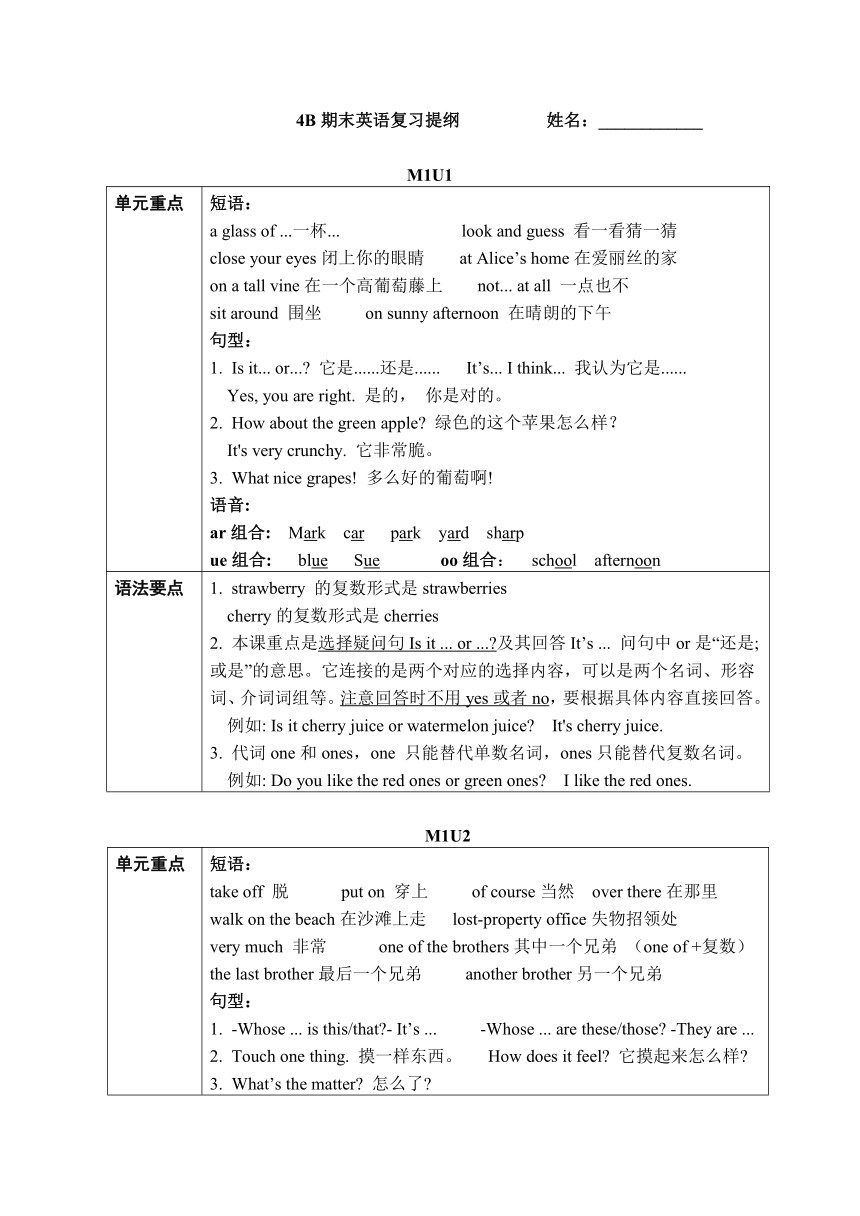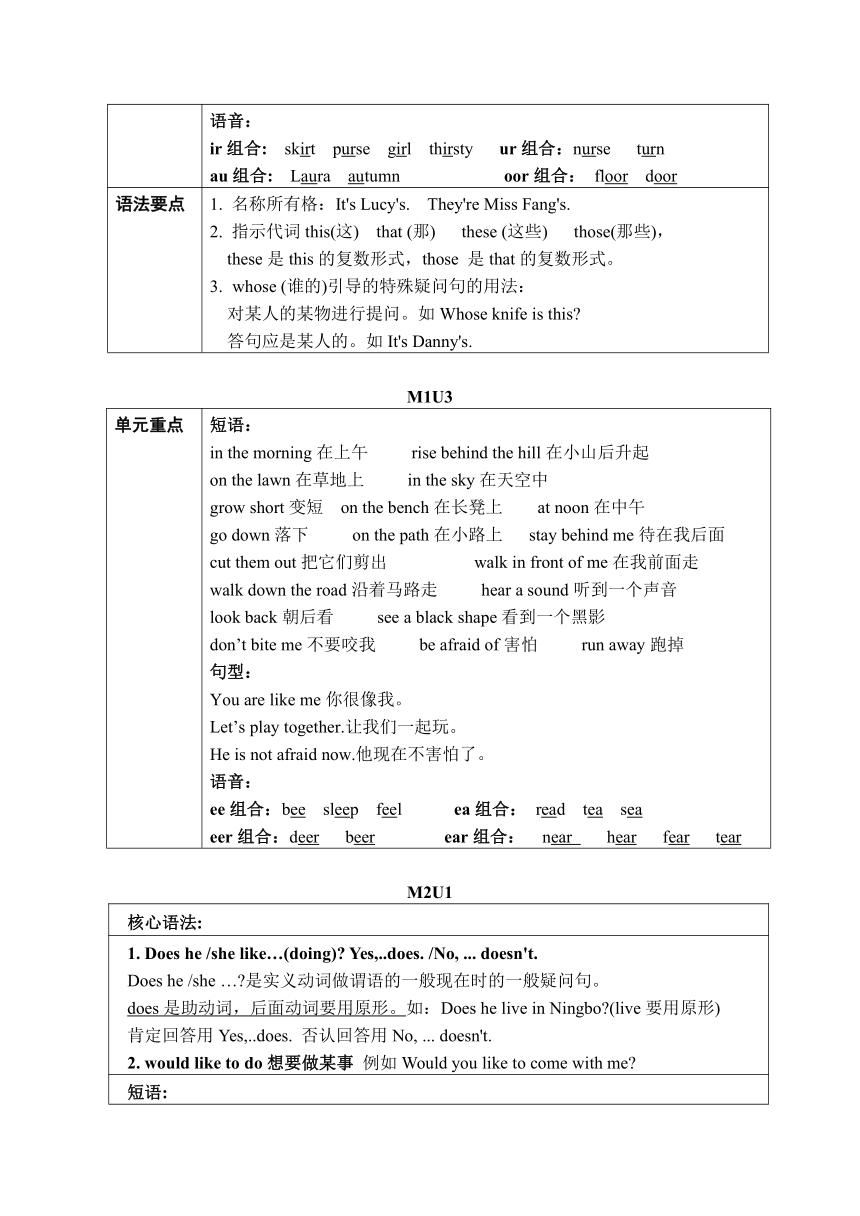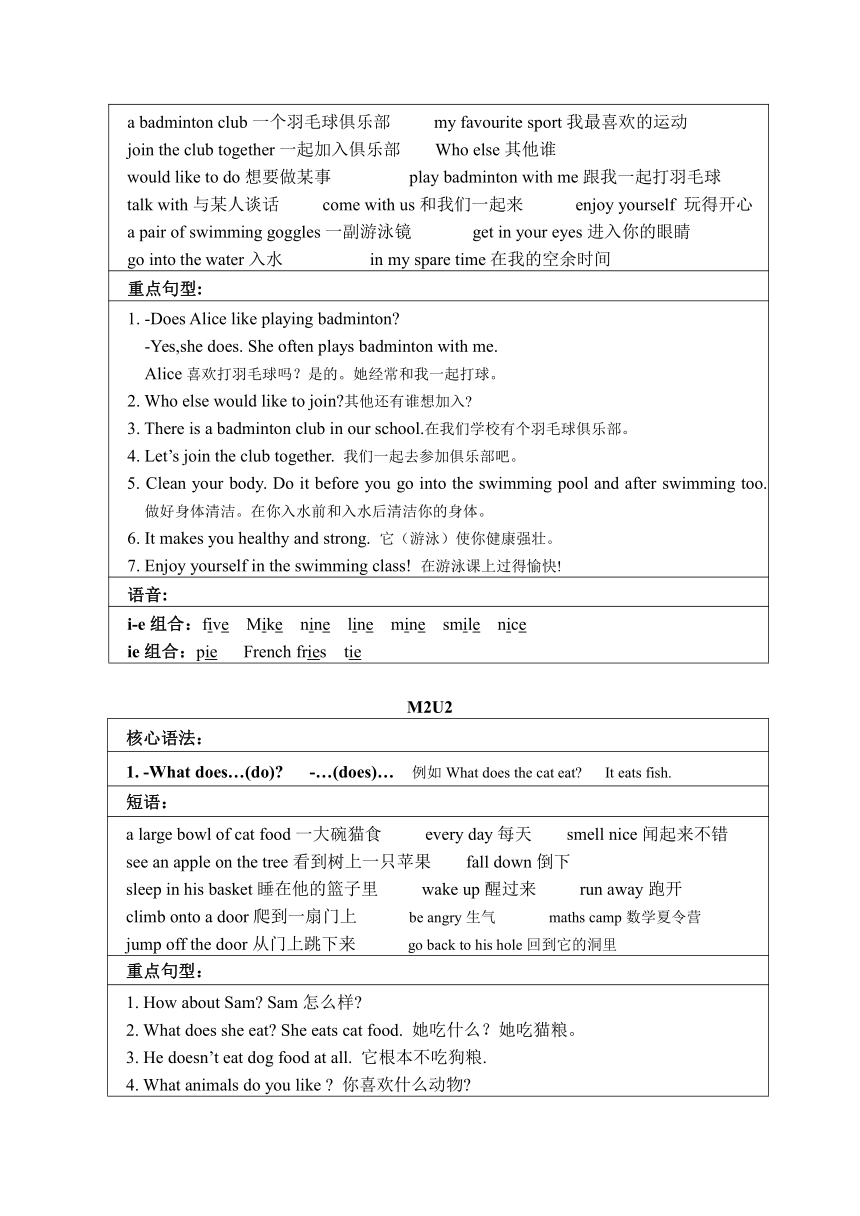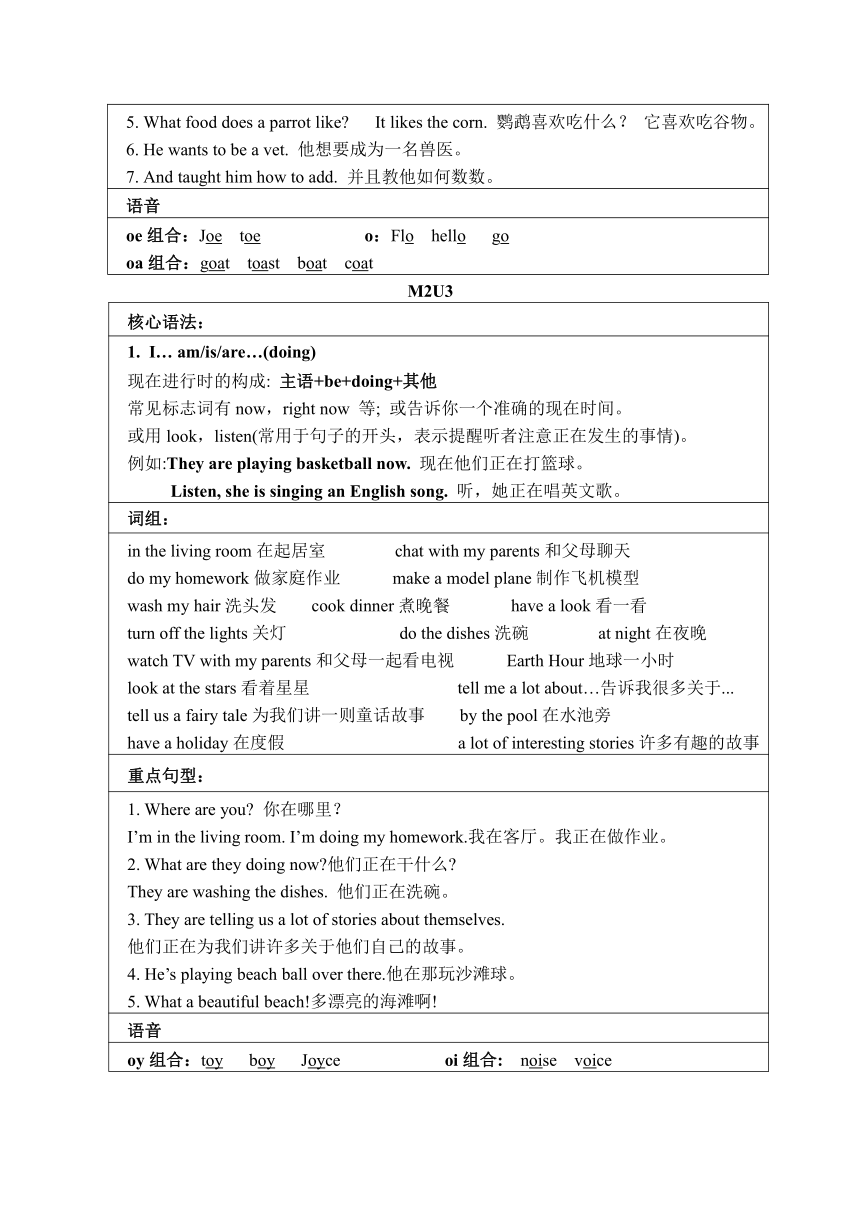牛津英语(试用版)四年级下册期末英语复习提纲(含书面表达范文)
文档属性
| 名称 | 牛津英语(试用版)四年级下册期末英语复习提纲(含书面表达范文) |

|
|
| 格式 | |||
| 文件大小 | 333.9KB | ||
| 资源类型 | 试卷 | ||
| 版本资源 | 牛津上海版(试用本) | ||
| 科目 | 英语 | ||
| 更新时间 | 2025-04-24 09:55:15 | ||
图片预览




文档简介
4B期末英语复习提纲 姓名:____________
M1U1
单元重点 短语:
a glass of ...一杯... look and guess 看一看猜一猜
close your eyes闭上你的眼睛 at Alice’s home在爱丽丝的家
on a tall vine在一个高葡萄藤上 not... at all 一点也不
sit around 围坐 on sunny afternoon 在晴朗的下午
句型:
1. Is it... or... 它是......还是...... It’s... I think... 我认为它是......
Yes, you are right. 是的, 你是对的。
2. How about the green apple 绿色的这个苹果怎么样?
It's very crunchy. 它非常脆。
3. What nice grapes! 多么好的葡萄啊!
语音:
ar组合: Mark car park yard sharp
ue组合: blue Sue oo组合: school afternoon
语法要点 1. strawberry 的复数形式是 strawberries
cherry的复数形式是 cherries
2. 本课重点是选择疑问句 Is it ... or ... 及其回答 It’s ... 问句中 or是“还是;
或是”的意思。它连接的是两个对应的选择内容,可以是两个名词、形容
词、介词词组等。注意回答时不用 yes或者 no,要根据具体内容直接回答。
例如: Is it cherry juice or watermelon juice It's cherry juice.
3. 代词 one和 ones,one 只能替代单数名词,ones只能替代复数名词。
例如: Do you like the red ones or green ones I like the red ones.
M1U2
单元重点 短语:
take off 脱 put on 穿上 of course当然 over there在那里
walk on the beach在沙滩上走 lost-property office失物招领处
very much 非常 one of the brothers其中一个兄弟 (one of +复数)
the last brother最后一个兄弟 another brother另一个兄弟
句型:
1. -Whose ... is this/that - It’s ... -Whose ... are these/those -They are ...
2. Touch one thing. 摸一样东西。 How does it feel 它摸起来怎么样
3. What’s the matter 怎么了
语音:
ir组合: skirt purse girl thirsty ur组合:nurse turn
au组合: Laura autumn oor组合: floor door
语法要点 1. 名称所有格:It's Lucy's. They're Miss Fang's.
2. 指示代词 this(这) that (那) these (这些) those(那些),
these是 this的复数形式,those 是 that的复数形式。
3. whose (谁的)引导的特殊疑问句的用法:
对某人的某物进行提问。如Whose knife is this
答句应是某人的。如 It's Danny's.
M1U3
单元重点 短语:
in the morning在上午 rise behind the hill在小山后升起
on the lawn在草地上 in the sky在天空中
grow short变短 on the bench在长凳上 at noon在中午
go down落下 on the path在小路上 stay behind me待在我后面
cut them out把它们剪出 walk in front of me在我前面走
walk down the road沿着马路走 hear a sound听到一个声音
look back朝后看 see a black shape看到一个黑影
don’t bite me不要咬我 be afraid of害怕 run away跑掉
句型:
You are like me你很像我。
Let’s play together.让我们一起玩。
He is not afraid now.他现在不害怕了。
语音:
ee组合:bee sleep feel ea组合: read tea sea
eer组合:deer beer ear组合: near hear fear tear
M2U1
核心语法:
1. Does he /she like…(doing) Yes,..does. /No, ... doesn't.
Does he /she … 是实义动词做谓语的一般现在时的一般疑问句。
does是助动词,后面动词要用原形。如:Does he live in Ningbo (live要用原形)
肯定回答用 Yes,..does. 否认回答用 No, ... doesn't.
2. would like to do想要做某事 例如Would you like to come with me
短语:
a badminton club一个羽毛球俱乐部 my favourite sport我最喜欢的运动
join the club together一起加入俱乐部 Who else其他谁
would like to do想要做某事 play badminton with me跟我一起打羽毛球
talk with与某人谈话 come with us和我们一起来 enjoy yourself 玩得开心
a pair of swimming goggles一副游泳镜 get in your eyes进入你的眼睛
go into the water入水 in my spare time在我的空余时间
重点句型:
1. -Does Alice like playing badminton
-Yes,she does. She often plays badminton with me.
Alice喜欢打羽毛球吗?是的。她经常和我一起打球。
2. Who else would like to join 其他还有谁想加入
3. There is a badminton club in our school.在我们学校有个羽毛球俱乐部。
4. Let’s join the club together. 我们一起去参加俱乐部吧。
5. Clean your body. Do it before you go into the swimming pool and after swimming too.
做好身体清洁。在你入水前和入水后清洁你的身体。
6. It makes you healthy and strong. 它(游泳)使你健康强壮。
7. Enjoy yourself in the swimming class! 在游泳课上过得愉快!
语音:
i-e组合:five Mike nine line mine smile nice
ie组合:pie French fries tie
M2U2
核心语法:
1. -What does…(do) -…(does)… 例如What does the cat eat It eats fish.
短语:
a large bowl of cat food一大碗猫食 every day每天 smell nice闻起来不错
see an apple on the tree看到树上一只苹果 fall down倒下
sleep in his basket睡在他的篮子里 wake up醒过来 run away跑开
climb onto a door爬到一扇门上 be angry生气 maths camp 数学夏令营
jump off the door从门上跳下来 go back to his hole回到它的洞里
重点句型:
1. How about Sam Sam怎么样
2. What does she eat She eats cat food. 她吃什么?她吃猫粮。
3. He doesn’t eat dog food at all. 它根本不吃狗粮.
4. What animals do you like 你喜欢什么动物
5. What food does a parrot like It likes the corn. 鹦鹉喜欢吃什么? 它喜欢吃谷物。
6. He wants to be a vet. 他想要成为一名兽医。
7. And taught him how to add. 并且教他如何数数。
语音
oe组合:Joe toe o:Flo hello go
oa组合:goat toast boat coat
M2U3
核心语法:
1. I… am/is/are…(doing)
现在进行时的构成: 主语+be+doing+其他
常见标志词有 now,right now 等; 或告诉你一个准确的现在时间。
或用 look,listen(常用于句子的开头,表示提醒听者注意正在发生的事情)。
例如:They are playing basketball now. 现在他们正在打篮球。
Listen, she is singing an English song. 听,她正在唱英文歌。
词组:
in the living room在起居室 chat with my parents和父母聊天
do my homework做家庭作业 make a model plane制作飞机模型
wash my hair洗头发 cook dinner煮晚餐 have a look看一看
turn off the lights关灯 do the dishes洗碗 at night在夜晚
watch TV with my parents和父母一起看电视 Earth Hour地球一小时
look at the stars看着星星 tell me a lot about…告诉我很多关于...
tell us a fairy tale为我们讲一则童话故事 by the pool在水池旁
have a holiday在度假 a lot of interesting stories许多有趣的故事
重点句型:
1. Where are you 你在哪里?
I’m in the living room. I’m doing my homework.我在客厅。我正在做作业。
2. What are they doing now 他们正在干什么
They are washing the dishes. 他们正在洗碗。
3. They are telling us a lot of stories about themselves.
他们正在为我们讲许多关于他们自己的故事。
4. He’s playing beach ball over there.他在那玩沙滩球。
5. What a beautiful beach!多漂亮的海滩啊!
语音
oy组合:toy boy Joyce oi组合: noise voice
M3U1
核心语法:
1. --Is/Are ...(doing) --Yes, ...is/are./No,...isn’t/aren’t.
现在进行时态的句子变为一般疑问句时要将 be动词提到句首,
其结构为:Am/Is/Are+主语+doing? 它的答句用 Yes或 No来回答。
2. 连词 and和 but的用法
and表示“和,并且”的意思,用于连接两个相同的东西。
but 表示“但是,可是”,含有转折的意思,即前后两个句子的意思相反。
短语:
excuse me不好意思 on the bench在长凳上 live by住在...边上 have a bath洗澡
sing songs唱歌 fly away飞走 have a nap打个盹 in the end最后
a week later一周以后 be careful小心 a thick card一张厚卡纸 a pair of scissors一把剪刀
重点句型:
1. --Is he watching TV in the living room --Yes, he is./No, he isn’t.
他正在客厅看电视吗?是的/不是。
2.Are they playing basketball Yes, they are./No, they aren’t.
他们正在打篮球吗?是的/不是。
3. Two old ladies are dozing on the bench. 两位老妇人正在长椅上打盹。
4. The bell rings, but the girl can’t hear it. 铃声响了,但女孩没有听见。
5. Your bell is too loud. 你的铃声太响了。
6. She always has a bath in the pond and sings some songs.
她总是在池塘里洗个澡,再唱几首歌。
7.Are you singing or crying 你是在唱歌还是在喊叫?
语音:
-are : square careful prepare -ear : bear pear wear -air:chair hair
M3U2
核心语法:
时间表达法:
直接表达法:整点:小时+o’clock ten o’clock 其他时间: 小时+分钟 five fifteen 5:15
间接表达法: 半点: half past+小时 half past one 1:30
不过半点:分钟+past+小时 a quarter past five 5:15
过半点: 几点差几分 分钟+to+小时 a quarter to one 12:45
短语:
do homework做家庭作业 have dinner吃晚饭 be back home from work工作完了回家
do a puzzle玩拼图 finish doing 完成做某事 watch the cartoon看卡通;看动画片
on the sofa在沙发上 wake up醒来 leave home离开家 all the way一路上
重点句型:
1.What time is it 现在是几点? It’s a quarter past seven. 现在是七点十五分。
2.What are you doing, Kitty 你正在做什么? I’m brushing my teeth.我正在刷牙齿。
3.--Are you doing your homework --Yes, I am. 你正在做家庭作业吗?是的。
4.It’s so much fun. 这很有趣。
5.It’s time for school. 到了上学的时间。
6.Can I finish watching the cartoon 我能把这部卡通片看完吗?
语音:
-ou : mouse aloud cloud mouse out -ow : owl bow brown cow
M3U3
核心语法:
1. 频率副词(频率由高到低)
always总是,usually通常,often经常,sometimes有时候,never从不
2. 时间相关的介词表达
①在具体的时刻用 at,如 at five o’clock, at half past ten。
②上午、下午、傍晚用 in,中午夜晚用 at,即 in the evening, at night, at noon。
③星期几前面用 on,如 on Monday,on Friday。
④在具体某一天的上午(下午或晚上)用 on如 on Wednesday evening。
⑤月份、年份前面用 in,如 in July,in 2021。
短语:
from…to…从...到... school library学校图书馆 Chinese Chess Club象棋俱乐部
have a good time享受美好时光 visit my grandparents拜访我的爷爷奶奶 see a film看电影
in the middle of在······的中间 play sports做运动 at weekends 在周末
重点句型:
1.What do you usually do at weekends I usually play badminton with my father.
你周末常常做什么?我常常和我的爸爸打羽毛球。
2.What day is it today It’s Tuesday. 今天是星期几?是星期二。
3.Peter goes home at two thirty on Friday afternoon. Peter在星期五下午两点半回家。
4.Do you go to the park at weekends Yes. Sometimes I go to the park with my family.
你周末会去公园吗?是的,有时候我和我的家人去公园。
5.Peter goes to school from Monday to Friday. Peter周一到周五去上学。
语音:
-ay : May day play today -ai : wait train rain
M4U1
核心语法:
1. It’s time to… /It’s time for…
该做什么的时候了。It’s time to +动词原形 例如 It’s time to have Music class.
It’s time for+名词 例如:It’s time for Music class.
2. play的搭配
①play 与乐器搭配时,乐器前面必须加定冠词 the 如: play the piano。
②play 与球类运动的词搭配时,球类运动词前面不加 the如: play volleyball。
短语:
in the music room 在音乐教室 in Music class 音乐课 over there 在那边 be full of 充满
walk behind 在... 后面走 walk away from 从... 离开 go back home 回到家
重点句型:
1.—Whose drum is it 它是谁的鼓? —It’s Danny’s drum. 它是丹尼的鼓。
2.Where is my violin 我的小提琴在哪里? It’s beside the piano. 它在钢琴旁边。
3.The city of Hamelin is full of mice. 哈梅林城到处都是老鼠。
4.The man plays beautiful music. 那个男人吹奏起美妙的音乐。
5. 乐器发音: piano---ding triangle---ting violin----zing drum----boom
M4U2
核心语法:
1. 节日
Festival Month Weather Activity Food
the Spring January or cold and watch fireworks, dumplings
Festival February windy have a big
dinner
the Dragon Boat May or June hot, sunny or watch dragon rice
Festival rainy boat races dumplings
the Mid-autumn September or cool and dry look at the mooncakes
Festival October beautiful moon
the Double October cool and dry climb the Double
Ninth Festival mountains, visit Ninth cakes
old people
短语:
old people’s home 敬老院 have some classes上一些课 the Chinese New Year 春节
on New Year’s Eve 在除夕晚上 table manners 餐桌礼仪 blow bubbles 吹泡泡
watch dragon boat races 观看龙舟赛 climb mountains 爬山 visit old people 拜访老人
traditional food传统食物 have a big dinner吃大餐 eat mooncakes吃月饼
重点句型:
1.What festivals do you like 你喜欢什么节日?
I like the Dragon Boat Festival. 我喜欢端午节。
2.What do you usually do during the Spring Festival 你在春节期间通常做什么?
I usually visit my grandparents and relatives. 我们吃美食并走亲访友。
3.What special food do you eat at the Mid-autumn Festival 中秋节你吃什么特殊食物?
4.Here are some flowers and cakes for you. 这是给您的花和蛋糕。
5.It usually comes in January or February. 它通常在一月或者二月。
M4U3
核心语法:
1. There be ... 句型
例如 There are four eggs in the nest. 判断 be 的变化遵从就近原则,即后面名词最近
的那个是单数,be就变 is; 是复数,be就变 are。
2. want to ...(do)
表示想要做某事。例如 He wants to buy some food. 他想买一些食物。
短语:
drive ... away 把... 赶走 sit on the nest 坐在窝上面 feed... with... 用... 喂...
all of... 所有的 stay with... 和...待在一起 look into 往... 里看了看
an ugly duckling 丑小鸭
重点句型:
1.Mother Duck sits on the nest. 鸭妈妈坐在窝上面(孵蛋)。
2.The eggs open. 蛋裂开了。
3.Mother Duck feeds her babies with small worms.
鸭妈妈用小虫喂她的宝宝们。
4.The big grey duckling eats all of them.
那个大个头的灰色小鸭把所有的虫子都吃了。
5.He does not want to stay with them. 他不想跟他们待在一起。
6.The ugly duckling looks into the pond. 丑小鸭往池塘看了看。
4B期末英语作文提纲
1. My favourite fruit
My favourite fruit is strawberries. They are red. They are rough.
They are small. They taste sweet. They smell nice. I often pick
strawberries with my parents in spring. I like strawberries very much.
2. My favourite animal
I like cats very much. I have cats. They’re white. They’re small. Their
eyes are big. They can climb trees. They like eating cat food and fish.
They like running. They’re very cute!
3. My home life (现在进行时)
My name’s Betty. It’s six o’clock. My mother is cooking dinner in the
kitchen. My father is watching TV in the living room. My brother is
making a model plane in his bedroom. He can do it very well. I am doing
my homework in my bedroom. We are all very happy.
4. My day (一般现在时)
This is my day. I get up at 7:00. I go to school at 7:40. I have seven
classes in school. I often play football after school. At 4:30, I go back
home. I usually do my homework at 6:00. I usually go to bed at 9:00. I
am busy every day, but I am happy.
5. My favourite festival
My favourite festival is the Spring Festival. The Spring Festival is in
January or February. It is cold and windy. At the Spring Festival, we have
a big dinner. We buy new clothes. We watch the fireworks. We eat
dumplings. I like the Spring Festival.
M1U1
单元重点 短语:
a glass of ...一杯... look and guess 看一看猜一猜
close your eyes闭上你的眼睛 at Alice’s home在爱丽丝的家
on a tall vine在一个高葡萄藤上 not... at all 一点也不
sit around 围坐 on sunny afternoon 在晴朗的下午
句型:
1. Is it... or... 它是......还是...... It’s... I think... 我认为它是......
Yes, you are right. 是的, 你是对的。
2. How about the green apple 绿色的这个苹果怎么样?
It's very crunchy. 它非常脆。
3. What nice grapes! 多么好的葡萄啊!
语音:
ar组合: Mark car park yard sharp
ue组合: blue Sue oo组合: school afternoon
语法要点 1. strawberry 的复数形式是 strawberries
cherry的复数形式是 cherries
2. 本课重点是选择疑问句 Is it ... or ... 及其回答 It’s ... 问句中 or是“还是;
或是”的意思。它连接的是两个对应的选择内容,可以是两个名词、形容
词、介词词组等。注意回答时不用 yes或者 no,要根据具体内容直接回答。
例如: Is it cherry juice or watermelon juice It's cherry juice.
3. 代词 one和 ones,one 只能替代单数名词,ones只能替代复数名词。
例如: Do you like the red ones or green ones I like the red ones.
M1U2
单元重点 短语:
take off 脱 put on 穿上 of course当然 over there在那里
walk on the beach在沙滩上走 lost-property office失物招领处
very much 非常 one of the brothers其中一个兄弟 (one of +复数)
the last brother最后一个兄弟 another brother另一个兄弟
句型:
1. -Whose ... is this/that - It’s ... -Whose ... are these/those -They are ...
2. Touch one thing. 摸一样东西。 How does it feel 它摸起来怎么样
3. What’s the matter 怎么了
语音:
ir组合: skirt purse girl thirsty ur组合:nurse turn
au组合: Laura autumn oor组合: floor door
语法要点 1. 名称所有格:It's Lucy's. They're Miss Fang's.
2. 指示代词 this(这) that (那) these (这些) those(那些),
these是 this的复数形式,those 是 that的复数形式。
3. whose (谁的)引导的特殊疑问句的用法:
对某人的某物进行提问。如Whose knife is this
答句应是某人的。如 It's Danny's.
M1U3
单元重点 短语:
in the morning在上午 rise behind the hill在小山后升起
on the lawn在草地上 in the sky在天空中
grow short变短 on the bench在长凳上 at noon在中午
go down落下 on the path在小路上 stay behind me待在我后面
cut them out把它们剪出 walk in front of me在我前面走
walk down the road沿着马路走 hear a sound听到一个声音
look back朝后看 see a black shape看到一个黑影
don’t bite me不要咬我 be afraid of害怕 run away跑掉
句型:
You are like me你很像我。
Let’s play together.让我们一起玩。
He is not afraid now.他现在不害怕了。
语音:
ee组合:bee sleep feel ea组合: read tea sea
eer组合:deer beer ear组合: near hear fear tear
M2U1
核心语法:
1. Does he /she like…(doing) Yes,..does. /No, ... doesn't.
Does he /she … 是实义动词做谓语的一般现在时的一般疑问句。
does是助动词,后面动词要用原形。如:Does he live in Ningbo (live要用原形)
肯定回答用 Yes,..does. 否认回答用 No, ... doesn't.
2. would like to do想要做某事 例如Would you like to come with me
短语:
a badminton club一个羽毛球俱乐部 my favourite sport我最喜欢的运动
join the club together一起加入俱乐部 Who else其他谁
would like to do想要做某事 play badminton with me跟我一起打羽毛球
talk with与某人谈话 come with us和我们一起来 enjoy yourself 玩得开心
a pair of swimming goggles一副游泳镜 get in your eyes进入你的眼睛
go into the water入水 in my spare time在我的空余时间
重点句型:
1. -Does Alice like playing badminton
-Yes,she does. She often plays badminton with me.
Alice喜欢打羽毛球吗?是的。她经常和我一起打球。
2. Who else would like to join 其他还有谁想加入
3. There is a badminton club in our school.在我们学校有个羽毛球俱乐部。
4. Let’s join the club together. 我们一起去参加俱乐部吧。
5. Clean your body. Do it before you go into the swimming pool and after swimming too.
做好身体清洁。在你入水前和入水后清洁你的身体。
6. It makes you healthy and strong. 它(游泳)使你健康强壮。
7. Enjoy yourself in the swimming class! 在游泳课上过得愉快!
语音:
i-e组合:five Mike nine line mine smile nice
ie组合:pie French fries tie
M2U2
核心语法:
1. -What does…(do) -…(does)… 例如What does the cat eat It eats fish.
短语:
a large bowl of cat food一大碗猫食 every day每天 smell nice闻起来不错
see an apple on the tree看到树上一只苹果 fall down倒下
sleep in his basket睡在他的篮子里 wake up醒过来 run away跑开
climb onto a door爬到一扇门上 be angry生气 maths camp 数学夏令营
jump off the door从门上跳下来 go back to his hole回到它的洞里
重点句型:
1. How about Sam Sam怎么样
2. What does she eat She eats cat food. 她吃什么?她吃猫粮。
3. He doesn’t eat dog food at all. 它根本不吃狗粮.
4. What animals do you like 你喜欢什么动物
5. What food does a parrot like It likes the corn. 鹦鹉喜欢吃什么? 它喜欢吃谷物。
6. He wants to be a vet. 他想要成为一名兽医。
7. And taught him how to add. 并且教他如何数数。
语音
oe组合:Joe toe o:Flo hello go
oa组合:goat toast boat coat
M2U3
核心语法:
1. I… am/is/are…(doing)
现在进行时的构成: 主语+be+doing+其他
常见标志词有 now,right now 等; 或告诉你一个准确的现在时间。
或用 look,listen(常用于句子的开头,表示提醒听者注意正在发生的事情)。
例如:They are playing basketball now. 现在他们正在打篮球。
Listen, she is singing an English song. 听,她正在唱英文歌。
词组:
in the living room在起居室 chat with my parents和父母聊天
do my homework做家庭作业 make a model plane制作飞机模型
wash my hair洗头发 cook dinner煮晚餐 have a look看一看
turn off the lights关灯 do the dishes洗碗 at night在夜晚
watch TV with my parents和父母一起看电视 Earth Hour地球一小时
look at the stars看着星星 tell me a lot about…告诉我很多关于...
tell us a fairy tale为我们讲一则童话故事 by the pool在水池旁
have a holiday在度假 a lot of interesting stories许多有趣的故事
重点句型:
1. Where are you 你在哪里?
I’m in the living room. I’m doing my homework.我在客厅。我正在做作业。
2. What are they doing now 他们正在干什么
They are washing the dishes. 他们正在洗碗。
3. They are telling us a lot of stories about themselves.
他们正在为我们讲许多关于他们自己的故事。
4. He’s playing beach ball over there.他在那玩沙滩球。
5. What a beautiful beach!多漂亮的海滩啊!
语音
oy组合:toy boy Joyce oi组合: noise voice
M3U1
核心语法:
1. --Is/Are ...(doing) --Yes, ...is/are./No,...isn’t/aren’t.
现在进行时态的句子变为一般疑问句时要将 be动词提到句首,
其结构为:Am/Is/Are+主语+doing? 它的答句用 Yes或 No来回答。
2. 连词 and和 but的用法
and表示“和,并且”的意思,用于连接两个相同的东西。
but 表示“但是,可是”,含有转折的意思,即前后两个句子的意思相反。
短语:
excuse me不好意思 on the bench在长凳上 live by住在...边上 have a bath洗澡
sing songs唱歌 fly away飞走 have a nap打个盹 in the end最后
a week later一周以后 be careful小心 a thick card一张厚卡纸 a pair of scissors一把剪刀
重点句型:
1. --Is he watching TV in the living room --Yes, he is./No, he isn’t.
他正在客厅看电视吗?是的/不是。
2.Are they playing basketball Yes, they are./No, they aren’t.
他们正在打篮球吗?是的/不是。
3. Two old ladies are dozing on the bench. 两位老妇人正在长椅上打盹。
4. The bell rings, but the girl can’t hear it. 铃声响了,但女孩没有听见。
5. Your bell is too loud. 你的铃声太响了。
6. She always has a bath in the pond and sings some songs.
她总是在池塘里洗个澡,再唱几首歌。
7.Are you singing or crying 你是在唱歌还是在喊叫?
语音:
-are : square careful prepare -ear : bear pear wear -air:chair hair
M3U2
核心语法:
时间表达法:
直接表达法:整点:小时+o’clock ten o’clock 其他时间: 小时+分钟 five fifteen 5:15
间接表达法: 半点: half past+小时 half past one 1:30
不过半点:分钟+past+小时 a quarter past five 5:15
过半点: 几点差几分 分钟+to+小时 a quarter to one 12:45
短语:
do homework做家庭作业 have dinner吃晚饭 be back home from work工作完了回家
do a puzzle玩拼图 finish doing 完成做某事 watch the cartoon看卡通;看动画片
on the sofa在沙发上 wake up醒来 leave home离开家 all the way一路上
重点句型:
1.What time is it 现在是几点? It’s a quarter past seven. 现在是七点十五分。
2.What are you doing, Kitty 你正在做什么? I’m brushing my teeth.我正在刷牙齿。
3.--Are you doing your homework --Yes, I am. 你正在做家庭作业吗?是的。
4.It’s so much fun. 这很有趣。
5.It’s time for school. 到了上学的时间。
6.Can I finish watching the cartoon 我能把这部卡通片看完吗?
语音:
-ou : mouse aloud cloud mouse out -ow : owl bow brown cow
M3U3
核心语法:
1. 频率副词(频率由高到低)
always总是,usually通常,often经常,sometimes有时候,never从不
2. 时间相关的介词表达
①在具体的时刻用 at,如 at five o’clock, at half past ten。
②上午、下午、傍晚用 in,中午夜晚用 at,即 in the evening, at night, at noon。
③星期几前面用 on,如 on Monday,on Friday。
④在具体某一天的上午(下午或晚上)用 on如 on Wednesday evening。
⑤月份、年份前面用 in,如 in July,in 2021。
短语:
from…to…从...到... school library学校图书馆 Chinese Chess Club象棋俱乐部
have a good time享受美好时光 visit my grandparents拜访我的爷爷奶奶 see a film看电影
in the middle of在······的中间 play sports做运动 at weekends 在周末
重点句型:
1.What do you usually do at weekends I usually play badminton with my father.
你周末常常做什么?我常常和我的爸爸打羽毛球。
2.What day is it today It’s Tuesday. 今天是星期几?是星期二。
3.Peter goes home at two thirty on Friday afternoon. Peter在星期五下午两点半回家。
4.Do you go to the park at weekends Yes. Sometimes I go to the park with my family.
你周末会去公园吗?是的,有时候我和我的家人去公园。
5.Peter goes to school from Monday to Friday. Peter周一到周五去上学。
语音:
-ay : May day play today -ai : wait train rain
M4U1
核心语法:
1. It’s time to… /It’s time for…
该做什么的时候了。It’s time to +动词原形 例如 It’s time to have Music class.
It’s time for+名词 例如:It’s time for Music class.
2. play的搭配
①play 与乐器搭配时,乐器前面必须加定冠词 the 如: play the piano。
②play 与球类运动的词搭配时,球类运动词前面不加 the如: play volleyball。
短语:
in the music room 在音乐教室 in Music class 音乐课 over there 在那边 be full of 充满
walk behind 在... 后面走 walk away from 从... 离开 go back home 回到家
重点句型:
1.—Whose drum is it 它是谁的鼓? —It’s Danny’s drum. 它是丹尼的鼓。
2.Where is my violin 我的小提琴在哪里? It’s beside the piano. 它在钢琴旁边。
3.The city of Hamelin is full of mice. 哈梅林城到处都是老鼠。
4.The man plays beautiful music. 那个男人吹奏起美妙的音乐。
5. 乐器发音: piano---ding triangle---ting violin----zing drum----boom
M4U2
核心语法:
1. 节日
Festival Month Weather Activity Food
the Spring January or cold and watch fireworks, dumplings
Festival February windy have a big
dinner
the Dragon Boat May or June hot, sunny or watch dragon rice
Festival rainy boat races dumplings
the Mid-autumn September or cool and dry look at the mooncakes
Festival October beautiful moon
the Double October cool and dry climb the Double
Ninth Festival mountains, visit Ninth cakes
old people
短语:
old people’s home 敬老院 have some classes上一些课 the Chinese New Year 春节
on New Year’s Eve 在除夕晚上 table manners 餐桌礼仪 blow bubbles 吹泡泡
watch dragon boat races 观看龙舟赛 climb mountains 爬山 visit old people 拜访老人
traditional food传统食物 have a big dinner吃大餐 eat mooncakes吃月饼
重点句型:
1.What festivals do you like 你喜欢什么节日?
I like the Dragon Boat Festival. 我喜欢端午节。
2.What do you usually do during the Spring Festival 你在春节期间通常做什么?
I usually visit my grandparents and relatives. 我们吃美食并走亲访友。
3.What special food do you eat at the Mid-autumn Festival 中秋节你吃什么特殊食物?
4.Here are some flowers and cakes for you. 这是给您的花和蛋糕。
5.It usually comes in January or February. 它通常在一月或者二月。
M4U3
核心语法:
1. There be ... 句型
例如 There are four eggs in the nest. 判断 be 的变化遵从就近原则,即后面名词最近
的那个是单数,be就变 is; 是复数,be就变 are。
2. want to ...(do)
表示想要做某事。例如 He wants to buy some food. 他想买一些食物。
短语:
drive ... away 把... 赶走 sit on the nest 坐在窝上面 feed... with... 用... 喂...
all of... 所有的 stay with... 和...待在一起 look into 往... 里看了看
an ugly duckling 丑小鸭
重点句型:
1.Mother Duck sits on the nest. 鸭妈妈坐在窝上面(孵蛋)。
2.The eggs open. 蛋裂开了。
3.Mother Duck feeds her babies with small worms.
鸭妈妈用小虫喂她的宝宝们。
4.The big grey duckling eats all of them.
那个大个头的灰色小鸭把所有的虫子都吃了。
5.He does not want to stay with them. 他不想跟他们待在一起。
6.The ugly duckling looks into the pond. 丑小鸭往池塘看了看。
4B期末英语作文提纲
1. My favourite fruit
My favourite fruit is strawberries. They are red. They are rough.
They are small. They taste sweet. They smell nice. I often pick
strawberries with my parents in spring. I like strawberries very much.
2. My favourite animal
I like cats very much. I have cats. They’re white. They’re small. Their
eyes are big. They can climb trees. They like eating cat food and fish.
They like running. They’re very cute!
3. My home life (现在进行时)
My name’s Betty. It’s six o’clock. My mother is cooking dinner in the
kitchen. My father is watching TV in the living room. My brother is
making a model plane in his bedroom. He can do it very well. I am doing
my homework in my bedroom. We are all very happy.
4. My day (一般现在时)
This is my day. I get up at 7:00. I go to school at 7:40. I have seven
classes in school. I often play football after school. At 4:30, I go back
home. I usually do my homework at 6:00. I usually go to bed at 9:00. I
am busy every day, but I am happy.
5. My favourite festival
My favourite festival is the Spring Festival. The Spring Festival is in
January or February. It is cold and windy. At the Spring Festival, we have
a big dinner. We buy new clothes. We watch the fireworks. We eat
dumplings. I like the Spring Festival.
同课章节目录
